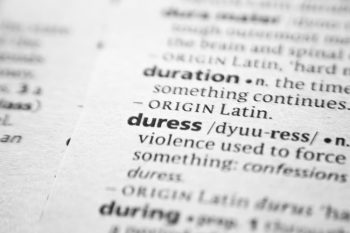Under New Jersey Law, Duress and Consent Are Considered Forms of Affirmative Defense when Facing Criminal Charges
 As is easily surmised, both affirmative defenses of duress and consent are case-specific and challenging to argue in criminal cases in New Jersey. Our top-tier team of defense attorneys at Chamlin, Uliano, and Walsh offers seasoned experience, which serves as an advantage to any client who enlists our criminal defense help.
As is easily surmised, both affirmative defenses of duress and consent are case-specific and challenging to argue in criminal cases in New Jersey. Our top-tier team of defense attorneys at Chamlin, Uliano, and Walsh offers seasoned experience, which serves as an advantage to any client who enlists our criminal defense help.
Differentiating Duress from Consent Under NJ Law
Duress is a situation in which a person commits an act because they were coerced, threatened, or the victim of violence. Duress is determined by a specific set of circumstances that prove the act committed was done out of fear of harm to themselves or another person. Essentially, duress exists when a person is forced to act or is prevented from acting by another through threats of violence, pressure that a reasonable person cannot tolerate, or death. Due to that duress, the victim must commit a crime they don’t want to commit. The threat has to be one of immediate death or physical injury. There must be a direct result between the threat and the crime the defendant is forced to commit. Consent can be used as an affirmative defense when the victim of the crime consented to the act, which means it was not criminal.
Necessary Elements for Consent To Be a Valid Defense
There are two kinds of defenses involving consent. Suppose the victim consents to the conduct charged or certain aspects of it. If the consenting party acts unlawfully, under their consent, the defense is not applicable. Secondly, the consent defense can be used if the consent doesn’t include the infliction of harm.
There are limitations on the New Jersey consent defense when it involves bodily harm or threats to inflict physical harm. In the case of bodily harm, a consent defense can only be used in three instances: if the bodily harm was not serious, was a logical result of an activity not prohibited by law, such as sports, or bodily harm resulting from medical treatment. Consent is not a viable defense if the person is a minor, cognitively impaired, intoxicated, or in some other capacity lacking in reasonable judgment. Also, consent is not a defense if there is force, deception, or duress.
Criteria for Employing the Duress Defense
If the action charged resulted from the defendant’s fear of violence, coercion, deception, or actual violence, duress can be used for a defense. Next, the threat of violence must be one that the average person would fear. Finally, it must be proven that there was no way to escape the violence or threat of violence; unable to leave the presence of the person threatening harm and danger was imminent.
Possible Legal Scenarios Involving Duress and Consent Defenses in NJ
Bobby Rae is driving her children to school. As she stops at a red light, a masked figure appears at her window, demanding she drive him and his companion to a nearby bank. He quickly runs into the bank while his cohort waits in the car to ensure their ride doesn’t go anywhere. He threatens Bobby Rae with harming her children should she fail to comply. Once the robbery has taken place, both men demand to be taken to a nearby train station, where they take off with the cash. Being a getaway driver is a serious offense, but she acted under duress because Bobby and her children were threatened with physical harm or death.
Nicholas confects, cuts, and sells drugs from the house he shares with his wife, Annabelle. When the narcotics division raids the house, Annabelle claims she is innocent because she only does what her husband tells her to do. This is not an example of duress, as there was no physical harm or threat of bodily injury. She could leave and live elsewhere to extract herself from the situation. It is also not a case of consent because she agreed to actions she knew were illegal.
The Orioles are playing the Angels. The pitcher from the Angels throws a pitch too close to the batter, hitting him in the ribs and cracking two of them. Because both players are participating in a sport where they know they could get hurt, they have consented and acknowledge that injury is possible.
Darryl gets a knock at the door. He is greeted by a couple he has never met. They ask him if he knows where his neighbor, Derek, could be as they were supposed to meet with him. According to the couple, they were buying Derek’s lawn mower. They ask Darryl if it is OK to take the lawnmower because they have already paid for it. Darryl says he has no objections. He later discovers that Derek didn’t know who they were and that they had stolen his lawnmower. Darryl didn’t have the authority to decide the lawn mower and could not use consent as a defense.
For consent to be used as a successful affirmative defense, it implies that the defendant acted willingly and voluntarily, as the element of force was not a part of the situation. Gang violence, for example, could not be used in this defense. Perhaps the participants were afraid not to act as their fellow gang members requested, but they put themselves in that situation by being in a gang in the first place.
Getting Familiar with the Concept of Necessity Defense
The defense of necessity is where the defendant claims they had to commit a crime. For example, if a prisoner escapes from a burning prison, they may claim their actions were one of necessity. Continuing to abscond and elude capture, however, is not a necessity. Necessity is when the defendant is placed in a position where they are obligated to commit a crime or face even worse consequences. Unlike duress, a necessity defense arises from circumstances beyond the defendant’s control. The necessity defense is viable if there were no reasonable alternatives or the harm caused was less than what they were trying to prevent. Duress involves a direct threat of violence.
 Our Manasquan Criminal Defense Lawyers Will Build a Strong Defense in Your Duress and Consent Case in NJ
Our Manasquan Criminal Defense Lawyers Will Build a Strong Defense in Your Duress and Consent Case in NJ
If you have been accused of a crime, allow our criminal defense attorneys to work with you to create your defense and work toward the most favorable result possible in Long Branch, Holmdel, Freehold, Wall, Red Bank, Howell, Belmar, and towns across Monmouth and Middlesex Counties. We are excellent litigators, and we know every case is unique. We will defend your rights and work your case from every angle.
If you have been charged with a crime or know someone who has, consider calling our firm at (732) 229-3200 or complete our short contact form. Let us take the worry and stress from your situation as we provide you with the outstanding representation you need and deserve.
